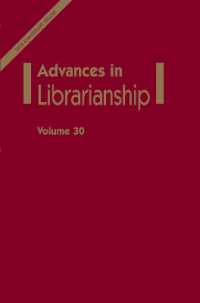- ホーム
- > 洋書
- > 英文書
- > Politics / International Relations
Full Description
In an ever more globalized world, sustainable global development requires effective intercultural co-operations. This dialogue between non-western and western cultures is essential to identifying global solutions for global socio-political challenges.
Modern Japanese Political Thought and International Relations critiques the formation of non-western International Relations by assessing Japanese political concepts to contemporary IR discourses since the Meji Restoration, to better understand knowledge exchanges in intercultural contexts. Each chapter focuses on a particular aspect of this dialogue, from international law and nationalism to concepts of peace and Daoism, this collection grapples with postcolonial questions of Japan's indigenous IR theory.
Contents
Japan as Potential: Communicating across Boundaries for a Global International Relations: An Introduction, Felix Rösch and Atsuko Watanabe / Part I: Challenging International Law and towards a Global IR? Investigations into Japan's Entry into the Westphalian System of Nation-States / Chapter 1. How Did Two Daos Perceive the International Differently? Atsuko Watanabe and Ariel Shangguan / Chapter 2. Japan's Early Challenge to Eurocentrism and the World Court, Tetsuya Toyoda / Chapter 3. Kotaro Tanaka (1890-1974) and Global International Relations, Kevin M Doak / Part II. Empire-Building or in Search for Global Peace? Japanese Political Thought's Encounter with the West / Chapter 4. Unlearning Asia: Fukuzawa's Un-regionalism in the Late Nineteenth Century, Atsuko Watanabe / Chapter 5. Pursuing a More Dynamic Concept of Peace: Japanese Liberal Intellectuals' Responses to the Interwar Crisis, Seiko Mimaki / Chapter 6. Rethinking the Liberal/Pluralist Vision of Japan's Colonial Studies, Ryoko Nakano / Part III. Lo








